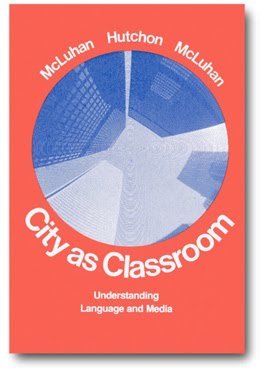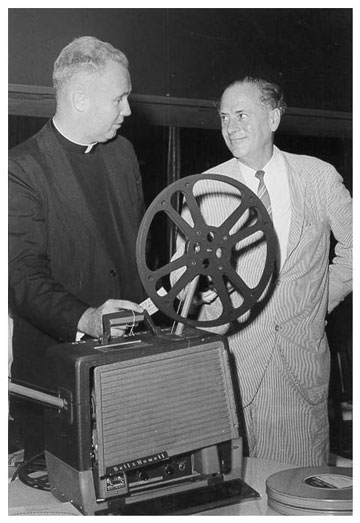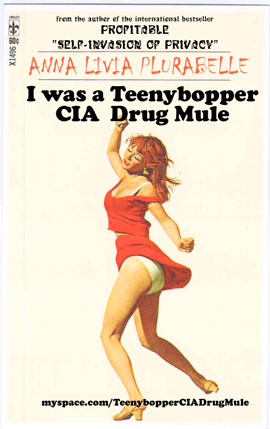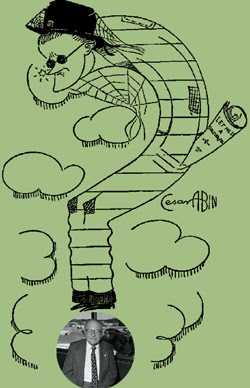McLuhan's City As Classroom Flips Into All-At-Onceness As Classroom
24 Sep 2011

W
HAT DOES THIS TITLE MEME, DEAR FRACTALIAN FRIENDS?
The important word in this opening title may be "as." Marshall McLuhan reworded Robert Browning's "our reach should exceed our grasp or what is heaven for?" into "our reach should exceed our grasp or what is a metaphor?" The "as" indicates that the city could be a learning tool as much as a school classroom itself. His 1977 book The City as Classroom: Understanding Language & Media puts on the secondary educational system, its teachers and administrators. It probes the city itself as a learning tool, just as his aphorism "We shape our tools, then they shape us" evokes "We ape them, and they ape us."
Well then, can't anything be a learning tool? Mumbled jumbled articles like this one? Is one tool actually better than another? In our explorations, can we invent NEW metaphors and NEW questions? That is my challenge to you, dear reader of this online magazine. How can you subvert (from within) and hack this otherness?
How can the all-at-onceness we swirl in be a learning tool? One of McLuhan's most important associates and influences was Wyndham Lewis, who invented the prank phone call and astutely declared: "Artists are engaged in writing a detailed history of the future because they are the only people who live in the present."
How can the all-at-onceness we swirl in be a learning tool? One of McLuhan's most important associates and influences was Wyndham Lewis, who invented the prank phone call and astutely declared: "Artists are engaged in writing a detailed history of the future because they are the only people who live in the present." Let's flip "city as classroom" into center without margins, and museums without walls. Let's explore how media (meaning everything from spoken word, printed word, theater, music, art, film, video, Internet, etc) shape both individuals and society. Merge "all times are happening now" (Joyce and Zappa) with "be here now" (Ram Dass).
Then again, it could flip into randomness as classroom. It's endless. Dig infinity.
"Communication means change: if something is communicated the recipient has changed in some manner or degree. Our 'commonsense' idea of communication is merely one of transporting messages from point to point." - Marshall McLuhan
McLuhan turned on the alarm to probe the percepts of everydayness epiphanies, and was accused of arson. He did not start the fire. He stressed that fiery discussions and pattern recognition can lead to comprehensive awareness. The classroom is neither good nor bad, the city is neither good nor bad. They have services and disservices. And remember, disservices, aka as breakdowns, can be breakthroughs. Integrate your aesthetic intelligence and your personal opinions when observing the big picture. Everything can lead to learning. Why limit yourself?

This dichotomy of doubleness tells me to embrace contradictions. The dualities prevail, and can sprout into threeness. The third step is the combination, the hybrid. What is the tertium quid? It is that "third something" that forms from using the tool for other than its designed purpose. Tertium quid is a term used in alchemy for "unidentified element present in a combination of two known ones." So if we combine the city and the classroom, what are the hidden effects? How do the effects precede the causes? Examine the original motives of the city and the classroom. What is the original motive of human's inventing "all-at-onceness" as a noun? We seem to be verbs. Robert Dobbs hoicks up the ecstatic new state of tribal immediacy, involvement, and simultaneity. He reminds us "Simultaneity is different from cycles. Cycles have a sense of duration. There is no duration when everything is in touch with everything at electric all-at-onceness."
Robert Dobbs hoicks up the ecstatic new state of tribal immediacy, involvement, and simultaneity. He reminds us "Simultaneity is different from cycles. Cycles have a sense of duration. There is no duration when everything is in touch with everything at electric all-at-onceness."
When asked if he is an optimist or a pessimist, McLuhan answered, "I am an apocalyptic." The root meaning of apocalypse is "to reveal." His emphasis is exploring, not explaining.
Review an excerpt from the new 2011 McLuhan book - son Eric & dad Marshall's Theories of Communication: "Does the content of each environment have to be the old environment? Does the new organization of energy that is a new environment automatically process the old environment into an archetypal ideal of art? The television environment has steadily upgraded the old movie forms into sentimentally valued art forms. The medieval world got the same treatment from the Gutenberg technology. If technological changes create new environments, or new process of energy organization, what is to be the process of the new satellite environments on our perceptions and experience?" (This McLuhan entry actually first appeared in the 1966 book The Man-Made Object, edited by Gyory Kepes)

Put that in your effects-precede-causes smoke and pipe it. Then compare and contrast party lines and phone hacking. Eric begins Theories of Communication - "A fundamental principle of this book is that communication entails change: the sine qua non of communication therefore is the matter of effect. If there is no effect, if there is no change in the audience, there is no communication. The approach is rhetoric to the core."
"Understanding is not having a point of view" - McLuhan
Having been raised in the classroom setting, can we really understand the relationship of learning on the streets versus learning in the classroom? Does hands on tend to engage the student more? So how does the gutter punk's learning process differ from the honor student's? How are they the same? What are the motives and consequences of the education systems today? What are the motives and consequences of the drop-out?
"All media are active metaphors in their power to translate experience into new form" - McLuhan
In the pursuit of transmutation of the learning process, how do we combine art and science?
Donald Theall wrote about McLuhan's "teasing people into believing his percepts were theoretical concepts." As my questions appear tricky, the quest is indeed full of paradox, contradictions and ambiguities. McLuhan knew that truth lingers somewhere within the enveloping haze of ambiguity. McLuhan's method, Theall observes, was one of the "satiric poet" and that this allowed him to freely "construct his paradoxical probes, so that they may have multiple, often contradictory meanings." Marshall quipped "You mean, my whole fallacy is wrong?" as a question, not as a statement, which is the way Woody Allen had him say it in Annie Hall. McLuhan's first book title The Mechanical Bride repurposed Marcel Duchamp, who yelped "I have forced myself to contradict myself in order to avoid conforming to my own taste."

It was used more as a strategy of rhetoric rather than as a method of building a bullet-proof theory. The problem, though, is that over the years many have looked for rules and laws in McLuhan's "paradoxical probes." As Theall notes, "The potential weakness appears when his rhetorico-poetic project becomes fact or formula rather than insight and intuition," ... "a great part of every human experience is passed in a state which cannot be rendered sensible by the use of wideawake language, cutanddry grammar and goahead plot." He is using dem Finneganese werdz. Marshall cracked the Finnegans Wake code. He probed it as the means to awaken permanently from the repetitive nightmare of history. Instead of trying to control the world, let's understand it.
McLuhan remarked, "Don't ask me if this is a good thing. I don't feel that any person is able yet to make value judgements of that sort. Our job is diagnosis and observation prior to judgement. But I have noticed over and over again that when people ask in the middle of some effort to chart an actual development, 'Is this a good thing?' they always mean, 'Is it a good thing for me?' 'How does it affect me? - I'm a doctor.' Or 'How will it affect me? - I'm an architect.' They don't mean, 'Is it good.' They mean, 'What will it do to me?' - It took me years to find out what they really meant by this strange constant request for value judgement. It's a Protestant sort of fixation, this 'Is it a good or a bad thing?' It comes from an obsession with efficient causes at an applied moment. The actual obsession with efficient causality - what you call activism - is basic to the Protestant outlook."
"My book The Gutenberg Galaxy makes no personal value judgements because it is concerned with formal causality and the study of effects, with reception aesthetics. Professor Eisenstein is concerned with efficient causality: her title is The Printing Press as an Agent of Change! This level of descriptive narrative leaves ample room for the noting of content and the making of value judgements, both of which are alien to the level of formal causality. In a utilitarian society, unattained in the formal structures and patterns of effect, efficient causality and moralizing is the only acceptable norm. Having written The Gutenberg Galaxy by way of turning in a fire alarm, it is curious to find some readers have charged me with arson..."
"I don't necessarily agree with everything I say." - McLuhan
*Gerry Fialka serves as the bored of directors for the ad agency Perfect Pitch Pop-Ups (aka Probing Perceptual Patterns), curates experimental films, puts on put-ons and avant gardely archives the avant garde.
Related Links and Credits
http://www.laughtears.com
http://www.venicewake.org
Thanks to John Fraim & symbolism.org for his articulate Donald Theall summary.Gerry's aural version of this article on Erik Davis' Progressive Radio show 9-8-11
Images courtesy of:
http://mycanvassesaresurrealist.blogspot.com/208/07/bob-dobbs-explains-finnegans-wake-via.html
__________________